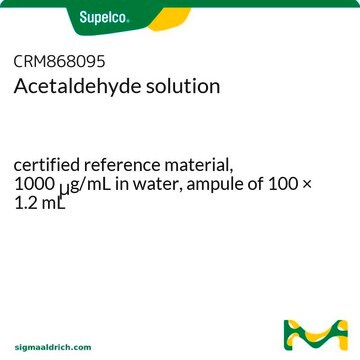This product is a 5 M Acetaldehyde solution in Tetrahydrofuran (THF) and may be considered a stock solution for some applications. Additional Acetaldehyde solutions are available in ethanol, water, and isopropranol. Please see the link below to review the available options:
https://www.sigmaaldrich.com/substance/acetaldehydesolution440575070
Kluczowe dokumenty
Wybierz wielkość
403,00 zł
Wybierz wielkość
About This Item
403,00 zł
Polecane produkty
Formularz
liquid
Poziom jakości
stężenie
5 M in THF
współczynnik refrakcji
n20/D 1.389
gęstość
0.868 g/mL at 20 °C
0.843 g/mL at 25 °C
grupa funkcyjna
aldehyde
temp. przechowywania
2-8°C
ciąg SMILES
[H]C(C)=O
InChI
1S/C2H4O/c1-2-3/h2H,1H3
Klucz InChI
IKHGUXGNUITLKF-UHFFFAOYSA-N
Szukasz podobnych produktów? Odwiedź Przewodnik dotyczący porównywania produktów
Hasło ostrzegawcze
Danger
Zwroty wskazujące rodzaj zagrożenia
Zwroty wskazujące środki ostrożności
Klasyfikacja zagrożeń
Carc. 1B - Eye Irrit. 2 - Flam. Liq. 2 - Muta. 2 - STOT SE 3
Organy docelowe
Central nervous system, Respiratory system
Zagrożenia dodatkowe
Kod klasy składowania
3 - Flammable liquids
Klasa zagrożenia wodnego (WGK)
WGK 3
Temperatura zapłonu (°F)
-25.1 °F - closed cup
Temperatura zapłonu (°C)
-31.7 °C - closed cup
Wykazy regulacyjne
Wykazy regulacyjne dotyczą głównie produktów chemicznych. Można w nich podawać ograniczoną liczbę informacji na temat produktów niechemicznych. Brak wpisu oznacza, że żaden ze składników nie znajduje się w wykazie. Użytkownik odpowiada za zagwarantowanie bezpiecznego i zgodnego z prawem stosowania produktu.
EU REACH Annex XVII (Restriction List)
Wybierz jedną z najnowszych wersji:
Masz już ten produkt?
Dokumenty związane z niedawno zakupionymi produktami zostały zamieszczone w Bibliotece dokumentów.
Klienci oglądali również te produkty
-
購入を検討しています。 719099 Sigma-Aldrich アセトアルデヒド 溶液 50ml 上記の試薬はアセトアルデヒド原液でしょうか?
1 answer-
Helpful?
-
Active Filters
Nasz zespół naukowców ma doświadczenie we wszystkich obszarach badań, w tym w naukach przyrodniczych, materiałoznawstwie, syntezie chemicznej, chromatografii, analityce i wielu innych dziedzinach.
Skontaktuj się z zespołem ds. pomocy technicznej






